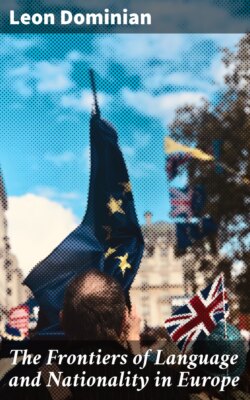Читать книгу The Frontiers of Language and Nationality in Europe - Leon Dominian - Страница 9
На сайте Литреса книга снята с продажи.
FOOTNOTES:
ОглавлениеTable of Contents
[7] The importance of the treaty of Verdun of this date with regard to the conflict between the French and the German languages is pointed out in the next chapter.
[8] G. Kurth: La frontière linguistique en Belgique et dans le nord de la France, Mém. couronnés, Acad. R. Sci. Let. et Beaux-Arts de Belg., XLVIII, Vol. 1, 1895, Vol. 2, 1898, Brussels.
[9] Cf. Map, “Ausbreitung der Romanischen Sprachen in Europa,” 1:8,000,000, in Gröber: Grundriss der Romanischen Philologie, Trübner, Strassburg, 1904–1906.
[10] The Belgae of Caesar are probably represented by the Teutonic populations of northern France—Flanders and Batavia—rather than by the Walloon. They are a Germanic tribe who made their appearance in Belgium about the third century, B.C.
[11] G. Touchard: Les langues parlées en Belgique, Le Mouv. Géogr., May 11, 1913, pp. 226–229.
[12] N. Warker: Die deutsche Orts- und Gewässernamen der Belgischen Provinz Luxemburg, Deutsche Erde, Vol. 8, 1909, pp. 99, 139.
[13] Statistique de la Belgique, Recensement Général de 1910, Vol. 2, 1912, Vol. 3, 1913, Brussels.
[14] G. Kurth: op. cit. Kurth’s work is based partly on place names. See also L. De Backer: La langue flamande en France, Samyn, Ghent, 1893.
[15] Le flamand et le français dans le nord de la France, 2me Congrès international pour l’extension et la culture de la langue française, Weissenbruch, Brussels, 1908.
[16] Le flamand dans le nord de la France, Ann. de Géogr., Vol. 20, Dec. 15, 1909, pp. 374–375.
[17] P. Reclus: Les progrès du Français dans l’agglomération Bruxelloise, La Géogr., Vol. 28, No. 5, Nov. 15, 1913, pp. 308–318.
[18] M. Wilmotte: Le Wallon, histoire, littérature des origines à la fin du XVIIe siècle, Rosez, Brussels, 1893. J. Demarteau: Le Wallon, son histoire et sa littérature, Liége, 1889.
[19] J. Demarteau: op. cit., p. 134.
[20] Germany’s violation of Belgian neutrality in 1914 has been followed by systematic endeavors to induce Flemings to favor annexation of their land to Germany on the plea of ancestral kinship.
[21] Luxemburg’s neutrality was guaranteed by the treaty of London, May 11, 1867, to which Britain, Austria, Prussia, France, Belgium, Holland, Italy and Russia were signatories.
[22] The Neutral Territory of Moresnet, Riverside Press, Cambridge, 1882, p. 14.
[23] Children under two and foreigners are included under this heading.
